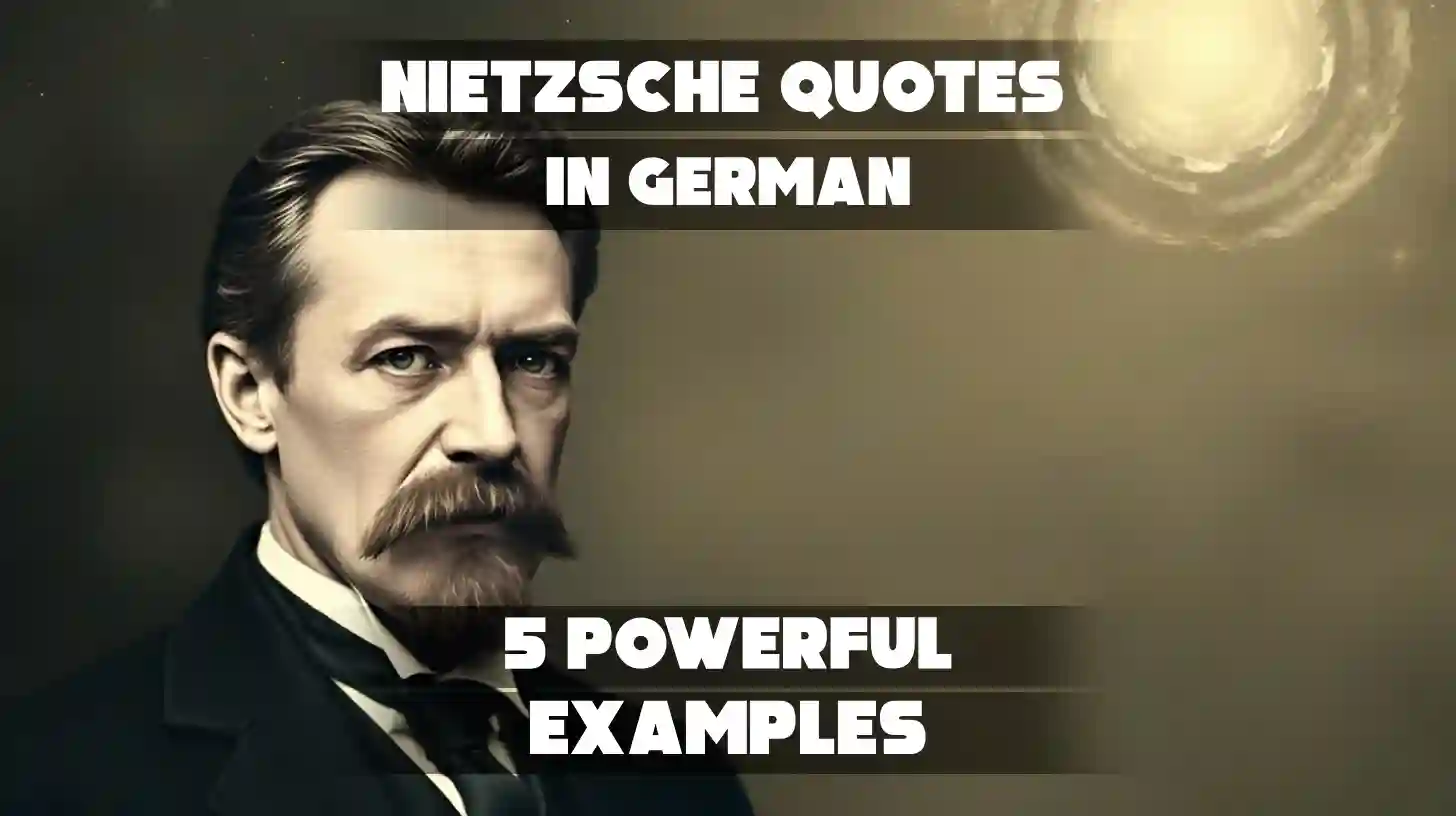Have you ever struggled to fully understand Nietzsche quotes in German? Translating his profound ideas can often dilute their true meaning.
Many readers face this challenge—trying to grasp the depth of Nietzsche’s words in translation can result in much of his brilliance being lost.
We’re here to guide you through the complexities of Nietzsche’s work. In this article, we’ll:
- Explore the challenges of translating Nietzsche’s philosophy
- Compare famous quotes in German and English
- Show why reading Nietzsche in German unlocks his true impact
By the end, you’ll gain a deeper connection to Nietzsche’s ideas and their lasting influence. Let’s begin!
- Who Was Friedrich Nietzsche?
- Nietzsche’s Writing Style in German
- Famous Nietzsche Quotes in German
- 1. Gott Ist Tot! Gott Bleibt Tot! Und Wir Haben Ihn Getötet!
- 2. Wer Mit Ungeheuern Kämpft, Mag Zusehends Zum Ungeheuer Werden
- 3. Man Muss Noch Chaos in Sich Haben, Um Einen Tanzenden Stern Gebären zu Können.
- 4. Die Höchsten Dinge Sind Die, Die Man Nicht Mit Den Augen Sieht, Sondern Nur Mit Dem Herzen Begreift
- 5. Der Mensch Ist Etwas, Das Überwunden Werden Muss
- The Importance of Translation in Nietzsche’s Work
- A Comparison of Nietzsche’s Quotes in German and English
- Why Understanding Nietzsche's Quotes in German is Essential?
- Nietzsche Quotes in German: A Recap
- FAQ
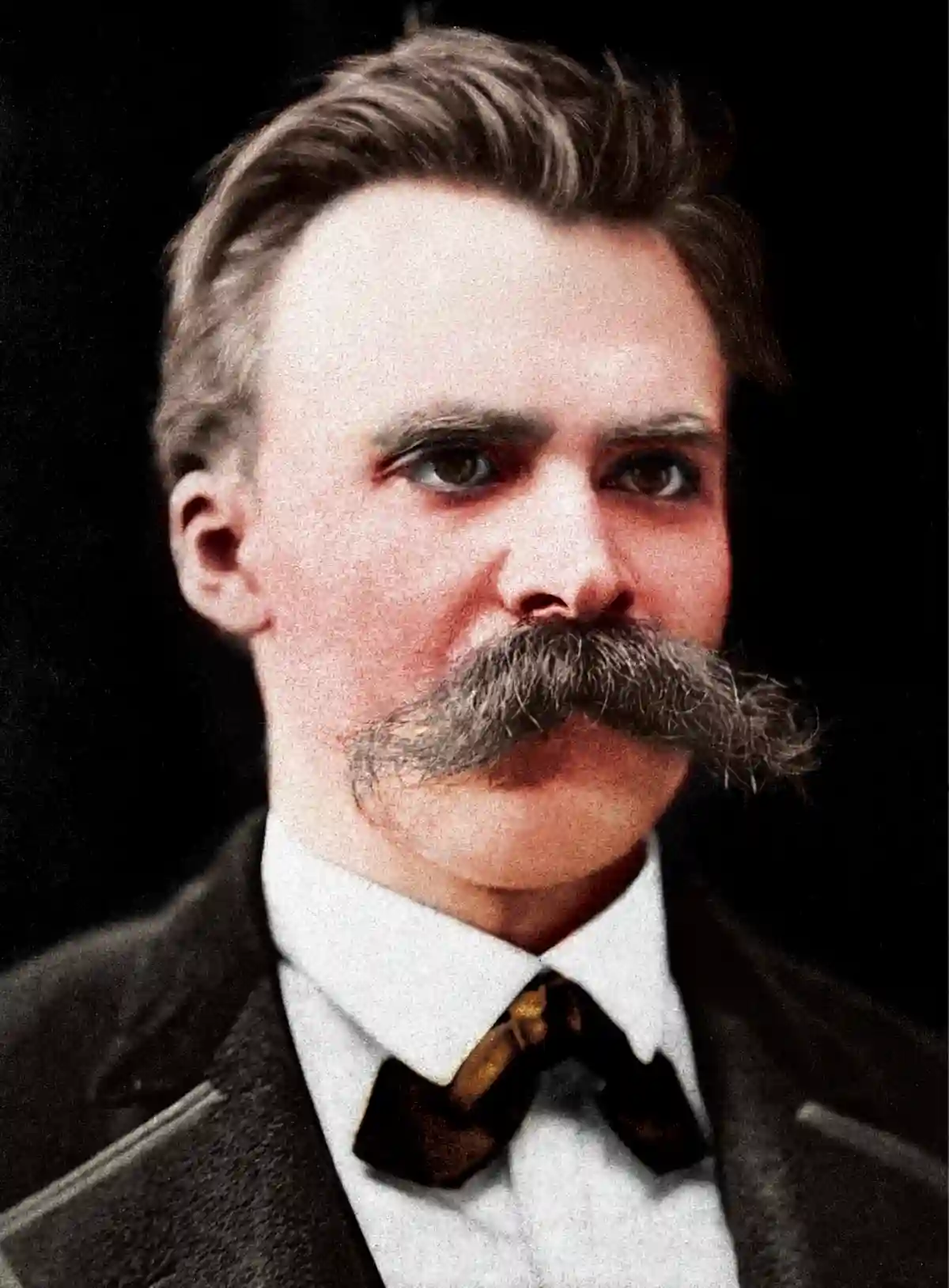
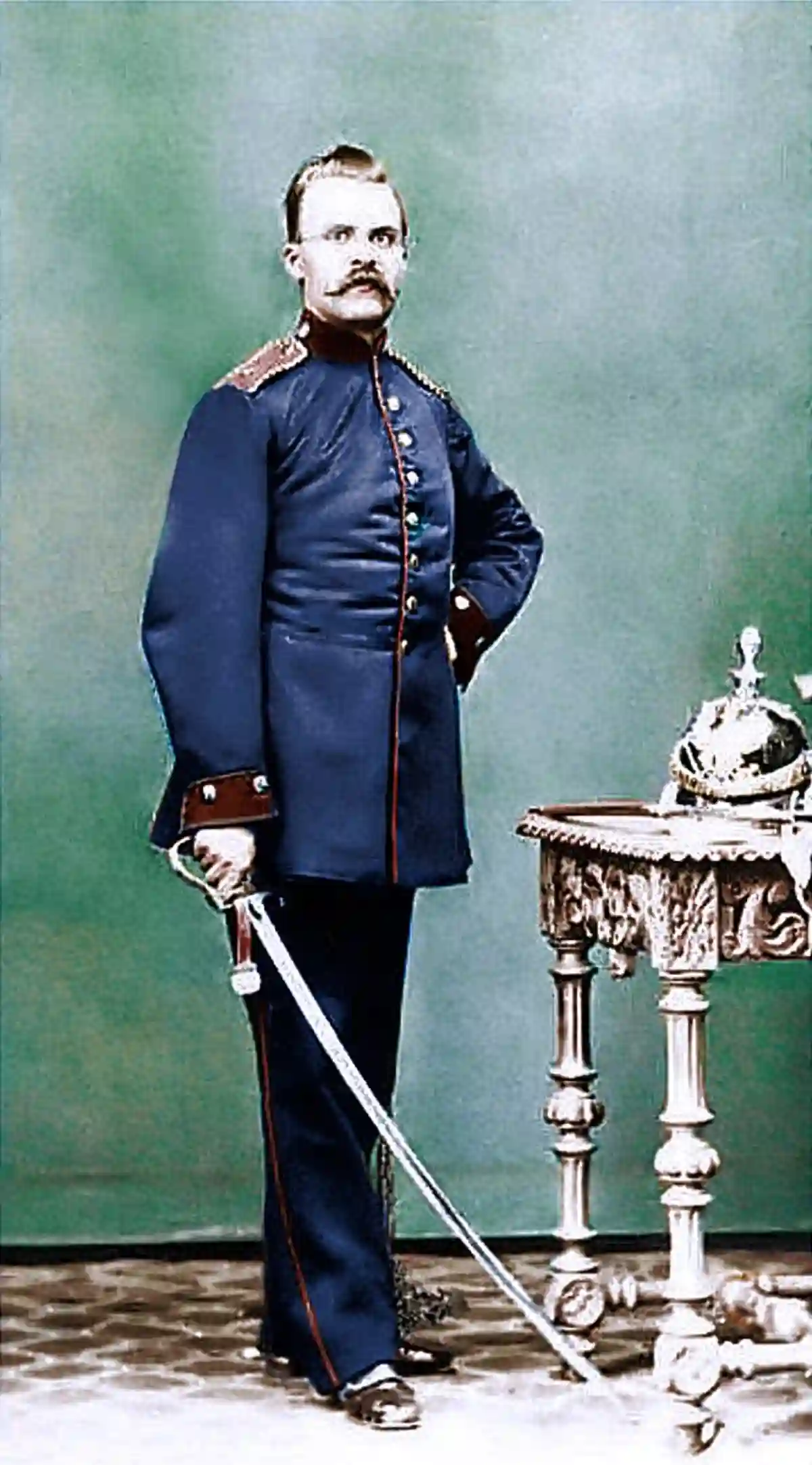

Who Was Friedrich Nietzsche?
Friedrich Nietzsche was a German philosopher known for his groundbreaking ideas. His philosophy encompasses concepts such as the will to power, the Übermensch (Superman), and eternal recurrence. Nietzsche challenged traditional morality and religion, exploring the individual’s potential to shape their destiny.
His work has deeply influenced philosophy, literature, psychology, and modern thinking. Nietzsche quotes in German continue to resonate for their raw insights into life, morality, and human nature.
His aphorisms, often simple yet profound, capture deep truths that encourage self-reflection and a break from societal norms. Nietzsche’s impact remains lasting, inviting both admiration and critique in equal measure.
See Also Nietzsche’s Greatest Quotes
Nietzsche’s Writing Style in German
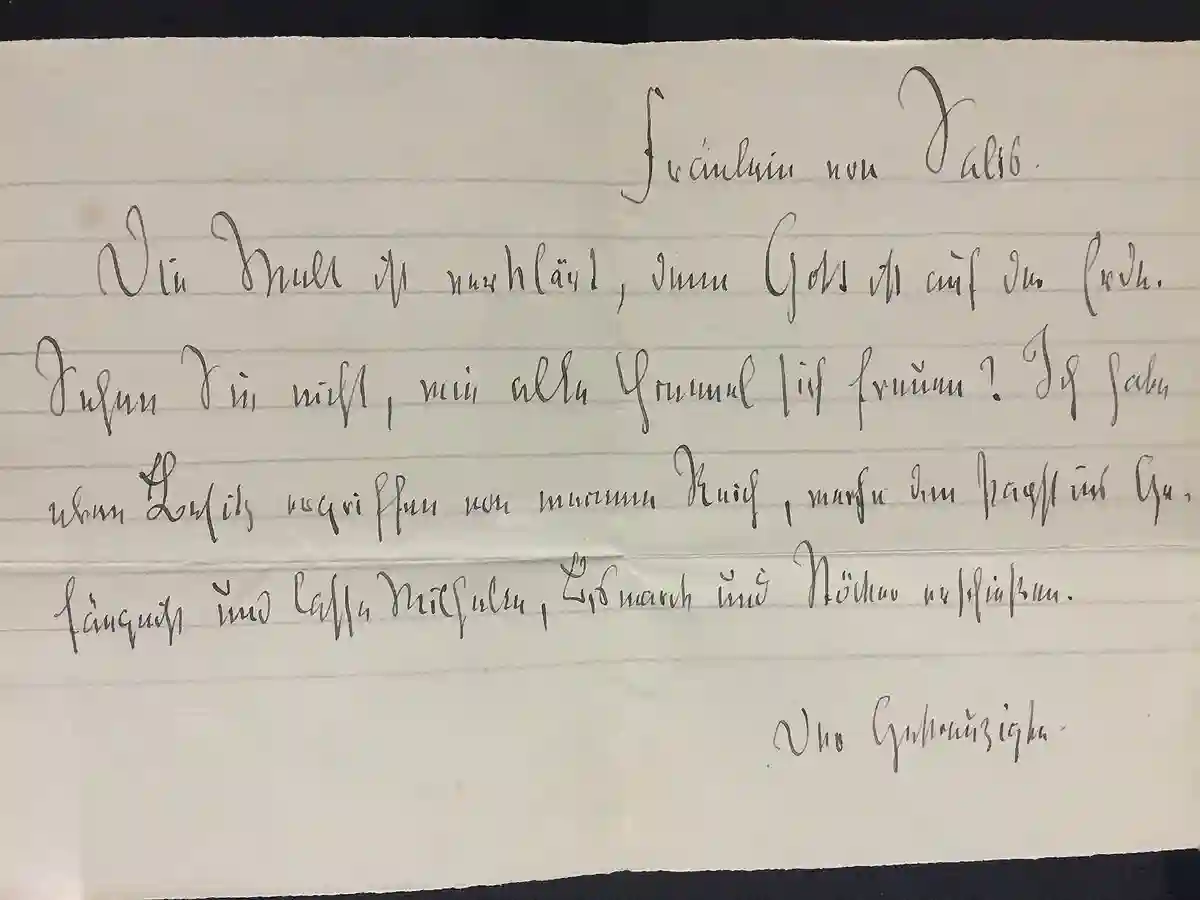
Nietzsche’s writing is known for its aphoristic style—short, powerful statements that convey deep ideas. Rather than writing long essays, he packed complex thoughts into concise phrases.
One example is “Man muss noch Chaos in sich haben, um wahre Weisheit zu finden“, which in original German means “One must have chaos in oneself to be able to give birth to a dancing star.“
This quote suggests that true wisdom and greatness come from accepting the chaos within us. We must confront the internal turmoil and, rather than shying away, laugh at the absurdity of life.
The dancing star symbolizes the creative transformation that arises from personal growth. Nietzsche challenges us to exist beyond conventional norms, using chaos as fuel for self-overcoming and creative expression.
See Also 3 Italian Philosopher’s Points of View and Their Unforgettable Quotes
Famous Nietzsche Quotes in German
1. Gott Ist Tot! Gott Bleibt Tot! Und Wir Haben Ihn Getötet!
“God is dead! God remains dead! And we have killed him!”
This famous quote from Die fröhliche Wissenschaft reflects a crisis of faith. Nietzsche argues that rejecting God leads to a moral breakdown in society. With no divine guidance, people must create their meaning in life.
This shift challenges old ways of thinking and opens the door to existentialism, where each person must face their path. Nietzsche quotes in German urge us to think beyond traditional beliefs for the sake of our growth.
2. Wer Mit Ungeheuern Kämpft, Mag Zusehends Zum Ungeheuer Werden
“He who fights with monsters should be careful lest he thereby become a monster.”
This Nietzsche quote warns against the danger of becoming what we hate. In fighting evil, there’s a risk of losing ourselves. Nietzsche reminds us that we must not let our battle destroy our spirit or self-identity.
The process of conflict must not blind us to our true values. We should always remember what matters.
3. Man Muss Noch Chaos in Sich Haben, Um Einen Tanzenden Stern Gebären zu Können.
“One must have chaos in oneself to be able to give birth to a dancing star.”
For Nietzsche, creativity comes from chaos. True greatness arises when we confront the chaos within us. He believes that personal struggles lead to wisdom and self-growth. When we face challenges, we destroy old limits and unlock new possibilities.
Spirit and freedom emerge from this process. This is how we become creators of our own lives.
4. Die Höchsten Dinge Sind Die, Die Man Nicht Mit Den Augen Sieht, Sondern Nur Mit Dem Herzen Begreift
“The highest things are those which cannot be seen with the eyes, but can only be understood with the heart.”
In Thus Spoke Zarathustra, Nietzsche suggests that true wisdom transcends the physical world. The most profound truths of existence cannot be seen or measured—they must be felt. He emphasizes that to understand life’s deeper meaning, we must listen with our hearts rather than just rely on what we see with our eyes.
Nietzsche believed that this emotional insight is essential for understanding life’s true value. This perspective calls us to look beyond the superficial and connect with the essence of existence, highlighting the importance of intuition and inner wisdom.
5. Der Mensch Ist Etwas, Das Überwunden Werden Muss
“Man is something that must be overcome.”
Nietzsche believed humans need to go beyond their current selves to become Übermensch (Superman). To do this, we must break free from old ways and think for ourselves.
Only what we find in our existence can lead us to true growth. Nietzsche’s faith in self-overcoming pushes us to destroy limits and talk about what truly matters. Nietzsche quotes in German challenge us to see deeper truths.
When Nietzsche says, “Blickt der Abgrund auch in dich hinein?” (“When you look into the abyss“), he shows that facing our fears leads to wisdom. It’s a process that can unlock spirit and freedom.
See Also 3 German Philosophers Points of View and Their 9 Unforgettable Quotes
The Importance of Translation in Nietzsche’s Work
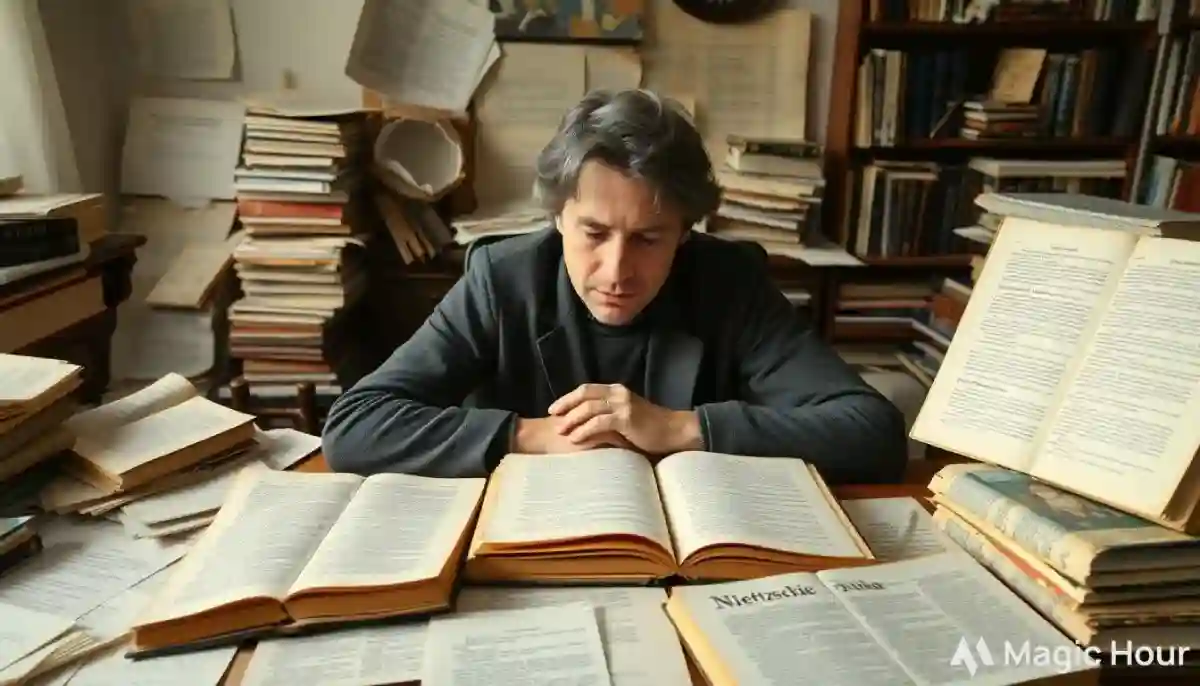
Translating Nietzsche presents significant challenges due to his complex use of language. His choice of words, irony, and metaphors often lose their impact in translation. Additionally, capturing Nietzsche’s tone and paradoxes can be difficult, as his writing is full of nuance.
Certain key philosophical terms, such as Übermensch and Wille zur Macht (will to power), are hard to translate precisely. These concepts are deeply tied to the German language and culture, making them challenging to convey fully in other languages.
For example, Nietzsche’s famous quote “Gott ist tot” (“God is dead“) has been interpreted in many ways, with subtle differences in meaning across translators. This highlights the significance of language in shaping philosophical ideas.
See Also Classic Literature Quotes
A Comparison of Nietzsche’s Quotes in German and English
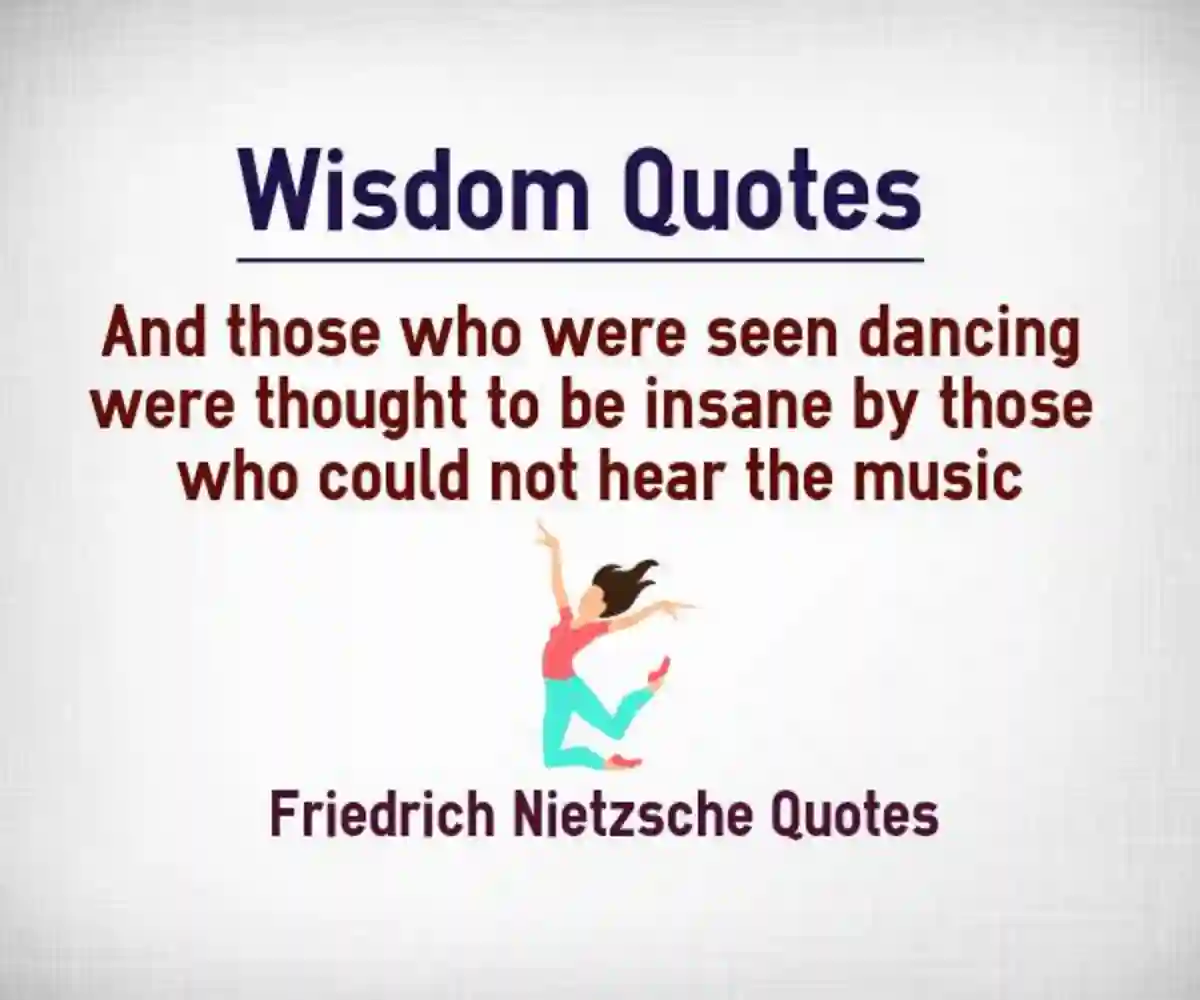
When comparing Nietzsche quotes in German with their English translations, only what is truly understood in German captures the full meaning. German has depth and precision that English often struggles with. For example, “Gott ist tot” (“God is dead”) feels different in German because it holds more history and cultural weight.
Und wenn du lange look at the differences, small variations, like the misinterpretation of “Der Mensch ist etwas, das überwunden werden muss” (“Man must be overcome“), can destroy the true essence of Nietzsche’s ideas.
Good translation can sometimes distort Nietzsche’s philosophy. Words like Übermensch and Wille zur Macht don’t have direct English translations, which can change the meaning. Nietzsche wanted readers to see (mag zusehn) his full vision, to challenge faith and existence, and live with higher esteem.
See Also Classic Russian Literature
Why Understanding Nietzsche’s Quotes in German is Essential?
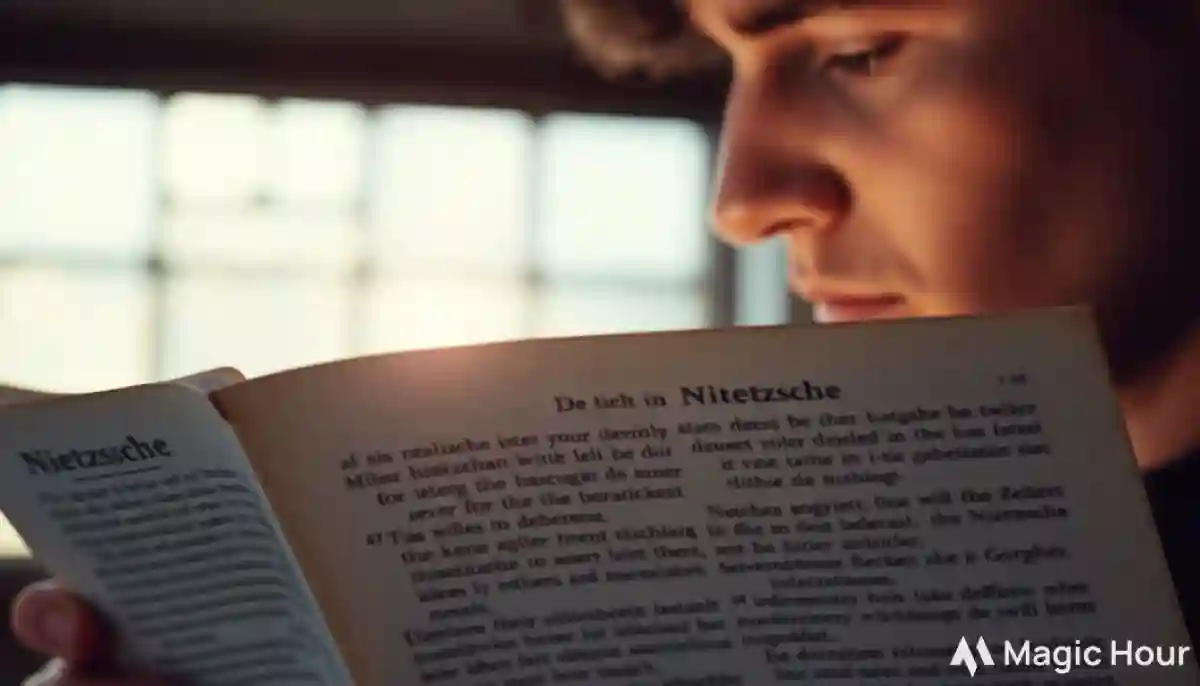
Understanding Nietzsche quotes in German is essential to grasp his full philosophy. Some subtle meanings, like überwinden (to overcome), are lost when translated. In German, Nietzsche’s ideas about hate, madness, and blood take on a different meaning, adding depth to his views on self and life.
For example, Wille zur Macht (will to power) carries more weight in the original language. It shows how human desires matter and how we shape our lives through our deeds. Reading Nietzsche in German helps you hear the spirit of his work, offering answers that are often lost in translation.
When you blickt der abgrund auch (“stare into the abyss”), you understand Nietzsche’s view of danger and twilight—life’s complexity where history and forgetting meet.
As Nietzsche said, “einen abgrund blickst dich hinein,” meaning if you look into the abyss, the abyss also looks back at you.

Nietzsche Quotes in German: A Recap
Friedrich Nietzsche’s work is still powerful today because of his bold ideas and deep insights. His quotes in German, like “Gott ist tot,” hold meanings that can be lost in translation. Nietzsche often spoke about the herd instinct, questioning what makes people follow others instead of thinking for themselves.
He also talked about Plato and faith, and how both can shape our view of life. Nietzsche’s ideas on desire, revenge, and the creator make us think about our deeds and what we want in life. His famous book, Spoke Zarathustra, explores these ideas in a shadow of twilight, where he challenges the way we think about right and wrong.
To fully understand his philosophy, it’s important to read Nietzsche quotes in German. This will give you the answer to many of life’s terrible questions. Good translation just can’t capture the depth of his ideas. Want to know more? Google it, or read his work in German!


